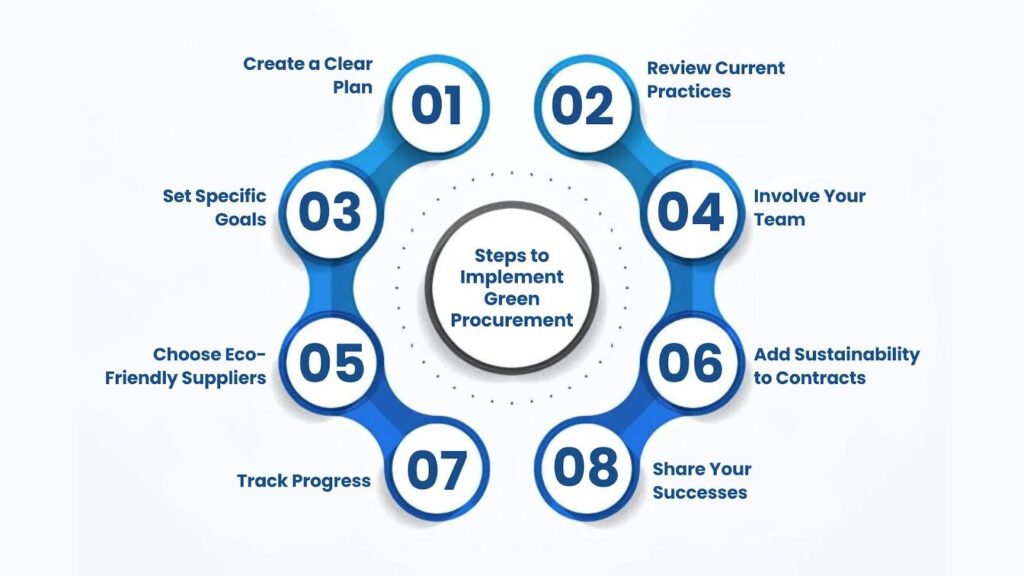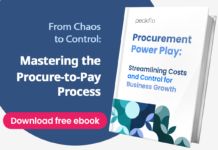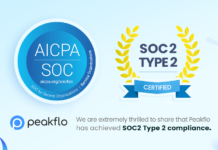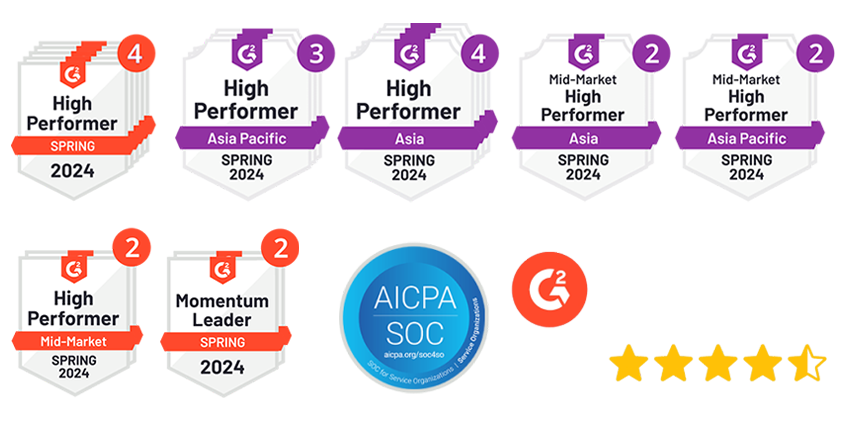Did you know sustainable procurement practices can help your business grow by up to 20%, keep customers happy, and protect the environment? More businesses care about their impact on the planet, and choosing green products is a smart way to support eco-friendly practices.
Environmental problems are serious, and choosing sustainable options isn’t just a nice thing to do—it’s necessary.
In this blog, we’ll explore the benefits of green procurement and why your business should adopt this approach. The benefits are huge, from saving energy and cutting waste to building a great reputation. Let’s elaborate on why being eco-friendly benefits both the planet and business success!
What is Sustainable Green Procurement?
Green procurement is a method that takes into account the environmental effect of products and services when making purchase decisions. It allows businesses to fulfill their product and service demands while also contributing to long-term development.
It means thinking about how we make a product, use it, and throw it away. This helps protect the Earth for future generations and focuses on three main goals:
- Helping the Environment: Businesses choose products made from recycled or natural materials. They also look for things that create less waste or pollution.
- Helping People: Companies make sure the workers who make the products are treated fairly and that their purchases help the community.
- Smart Spending: Being eco-friendly can also save money. For example, buying energy-saving products might cost more at first but saves money over time.
Why Green Procurement Matters Now
Green procurement is more important than ever because of some big global challenges:
- Climate Change: Extreme weather is becoming more common because of climate change, and businesses know they need to reduce their impact on the planet. By choosing green products, companies can lower their carbon footprints and help fight climate change.
- Resource Scarcity: Resources like water, trees, and minerals are running low. Businesses are choosing suppliers that use sustainable practices to protect them.
- Regulatory Pressure: Governments are creating tougher rules to protect the environment. Businesses using green procurement are already following these rules and avoiding penalties.
People, Planet, and Profit for Sustainable Procurement
Green procurement is about balancing three important things: people, planet, and profit. This is called the “triple bottom line,” and it helps businesses make choices that are good for everyone:
- People: Businesses choose suppliers that treat workers fairly and help local communities. For example, they might buy from a local business that provides good wages and is socially responsible.
- Planet: Green procurement helps protect the environment by reducing waste and pollution. For example, a construction company might use recycled materials in their projects to cut down on landfill waste.
- Profit: Sustainable products might cost a bit more at first, but they often save money in the long run. For example, energy-efficient products lower electricity bills, and green practices can attract more customers.
Economic Benefits of Green Procurement
Green procurement is when businesses choose products and services that are better for the environment. This smart choice helps companies save money, reduce risks, and grow their business.
1. Cost Savings
Using green procurement can save businesses a lot of money. Here’s how:
- Lower Material Costs: Recycled materials are often cheaper than new ones. Using recycled paper saves energy and reduces pollution, which lowers costs.
- Energy Efficiency: Products like LED lights or sustainable appliances use less power, which reduces electricity bills. Companies using renewable energy, like solar or wind power, save even more in the long run.
- Less Maintenance: Eco-friendly products last longer and need fewer repairs, so businesses spend less on fixing or replacing things.
2. Increased Revenue
Green procurement can help businesses earn more revenue. Here’s how:
- Better Reputation: Companies that use green practices look good to customers who care about the planet. This leads to more sales and loyal customers.
- Innovation: Focusing on sustainability encourages businesses to come up with new ideas.
- Competitive Advantage: Green businesses stand out from others. Customers are more likely to buy from companies that care about the environment, giving those businesses an edge.
- Easy Access to Capital: Companies with good environmental practices may find it easier to get investments or loans because many investors like to support eco-friendly businesses.
3. Reducing Risks
Green procurement helps businesses avoid risks like fines for harming the environment or problems caused by climate change. Using eco-friendly practices helps companies stay safe from future issues.
4. Securing Supply
By using sustainable sources, businesses ensure their supply chains are reliable. This helps avoid problems caused by shortages of resources or environmental issues.
How Green Procurement Impacts the Supply Chain
The benefits of green procurement affect every part of the supply chain, from sourcing materials to delivering products.
Supplier Relationships
When businesses choose suppliers who also care about sustainability, it helps build stronger, more successful relationships:
- Better Communication: Companies and suppliers that talk about sustainability can work together to adopt greener practices, which benefits both sides.
- Shared Innovation: Working closely with suppliers leads to new, eco-friendly products that meet customer demand for green options.
Risk Management
Green procurement helps companies manage risks, such as changes in laws or disruptions in the supply chain.
- Following the Rules: Governments are creating more rules about the environment. Companies that use green procurement are better prepared to follow these rules and avoid fines.
- Stronger Supply Chains: Sustainable practices help companies prepare for challenges such as climate change or resource shortages. Working with different suppliers and buying locally makes supply chains stronger and more reliable.
Environmental Benefits of Sustainable Procurement
Sustainable procurement means choosing products and services that are good for the environment. When businesses make these choices, they help protect the planet in many ways. Let’s look at the environmental benefits of this type of purchasing.
- Saves Natural Resources
Sustainable procurement helps businesses use fewer natural resources, like wood, metals, and water. When businesses buy recycled products, they help save these resources.
For example, if a company buys paper made from recycled materials instead of cutting down trees, they help protect forests. Choosing products made with fewer raw materials helps keep our planet’s resources safe for future generations.
- Lowers the Carbon Footprint
Every product we buy has a “carbon footprint.” This is the amount of greenhouse gases, like carbon dioxide, released when making and transporting a product. By buying eco-friendly products, businesses can lower their carbon footprint.
For instance, power-saving fridges or air conditioners burn less fossil fuel (like coal or gas), which helps keep the planet cooler. Buying from local suppliers also reduces the carbon footprint because products don’t need to be shipped long distances.
- Encourages Green Innovation
Sustainable procurement doesn’t just help businesses make good choices now—it also encourages suppliers to create better, eco-friendly products. When businesses ask for green products, suppliers work harder to make better, more sustainable options.
As more companies ask for electric cars, car manufacturers are improving their designs and making them more affordable. This helps push innovation and creates even more eco-friendly solutions for everyone.
- Protects Ecosystems and Wildlife
Sustainable procurement helps protect ecosystems like forests, oceans, and wildlife. When businesses choose products made from sustainable materials, they support practices that protect the environment.
For example, some companies buy seafood from responsible fisheries to prevent overfishing and protect marine life. Similarly, buying wood or paper certified by groups like the Forest Stewardship Council (FSC) helps ensure forests are managed without harming wildlife.
Social Benefits of Green Procurement
Sustainable green procurement is good for the environment and also brings social benefits. One big benefit is the positive effect it has on a company’s reputation and its responsibility to society.
Builds a Positive Brand Image
Companies making eco-friendly choices show that they care about the planet. This helps them create a good image. More people today care about the environment and want to support businesses that make responsible choices.
People are more likely to trust and buy from companies that act responsibly, like Unilever, a company known for its focus on sustainability.
Sustainability matters to employees, too. Many workers today want to work for companies that care about the environment and help society. Companies that focus on sustainability attract workers who share these values.
For example, businesses that reduce waste, use renewable energy, or help local communities make their employees proud. This leads to happier, more motivated workers who stay with the company longer.
Strengthens Relationships with Communities
Sustainable practices help companies build strong relationships with the communities they are part of. For example, businesses that buy from local farmers or fair-trade suppliers help improve people’s lives in those areas.
By choosing products made ethically, companies make sure workers are treated fairly and paid well. This builds trust and shows the company cares about people, helping create a stronger, more supportive community.
Encourages Ethical Practices across the Supply Chain
When companies work with suppliers focusing on sustainability, they encourage better practices throughout the supply chain. This means they’re supporting eco-friendly products and promoting fair treatment of workers and responsible production.
For example, by buying organic food, a company ensures fair pay for farm workers and avoids harmful chemicals. This decision inspires other companies to follow suit and adopt more ethical practices.
Enhances Public Trust and Credibility
Companies that commit to sustainable green procurement build trust with the public. When businesses make real efforts to be more sustainable, people see them as more reliable and trustworthy. This trust is key for long-term success.
When a company is open about how it sources its products or reduces waste, customers know they are doing the right thing. This transparency strengthens a company’s reputation and can lead to loyal customers and stronger business relationships.
Supports Social Equity and Inclusion
Sustainable green procurement can also help promote fairness and inclusion. Many companies today buy products that support communities or groups that are often overlooked.
Example: A business might buy from women-owned companies or support organizations that hire workers from disadvantaged communities.

Practical Steps to Implement Green Procurement
Green procurement helps businesses support the environment while getting the products and services they need. By following some easy steps, businesses can make eco-friendly choices that help their sustainability goals.
- Create a Clear Plan:
Start by making a plan for sustainable procurement. This means deciding what to achieve, like reducing pollution or using better materials. Your plan should fit with your company’s overall goals. - Review Current Practices:
Look at how you are buying products now. Who are your suppliers? Are their practices helping or hurting the environment? This will help you see where changes are needed. - Set Specific Goals:
Set clear, measurable goals for sustainability. For example, aim to reduce your waste or lower energy use by a certain amount next year. - Involve Your Team:
Get everyone involved, especially your procurement team and managers. Their support is important to make your green procurement plan successful. - Choose Eco-Friendly Suppliers:
Pick suppliers who care about sustainability. Look for companies that focus on the environment and social responsibility. Your suppliers must share your values. - Add Sustainability to Contracts:
Make sure your procurement contracts include sustainability rules. This encourages your suppliers to stick to eco-friendly practices. - Track Progress:
Check regularly to see if your suppliers are meeting your sustainability goals. You can use simple ways to measure, like how much energy they use or waste they produce. - Share Your Successes:
Be open about your green procurement progress. Sharing your results builds trust and encourages others to keep working on sustainability.
By following these steps, businesses can make a big difference in their environmental impact and achieve their goals. Green procurement is an easy way to help the planet and the future.
Examples of Sustainable Procurement Categories
Sustainable procurement helps protect the environment and support fair practices. Here are some areas where businesses can make a difference by choosing eco-friendly options:
- Single-Use Plastics (SUP)
One big change is reducing single-use plastics, like straws, plates, and bags. Metal straws last longer than plastic ones and help reduce waste. Many restaurants and airlines are switching to reusable plates and cups instead of using disposable plastic or paper. - IT Hardware
When buying tech, businesses need to think about more than just price. They should consider how much energy the equipment uses, how long it lasts, and how it’s disposed of. For example, choosing computers made from recycled materials is a great option. - Agricultural Products
Sourcing sustainably grown food is another key area. Many businesses now prioritize organic or fair trade products like coffee, tea, and fruits. These products help protect the environment and support fair wages for farmers. - Renewable Energy
Businesses can reduce their impact using renewable energy, like solar or wind power, which helps lower energy use and reduce emissions. - Sustainable Fashion
The fashion industry is working to become more eco-friendly. Companies are choosing materials like organic cotton or recycled fabrics. Some brands even reuse or recycle old clothes instead of throwing them away, helping to reduce waste. - Sustainable Building Materials
When building or renovating, choosing eco-friendly materials makes a big difference. Materials like bamboo or recycled wood help reduce environmental impact. Many buildings also use efficient systems like solar panels to save energy.
By making smart choices in these areas, businesses can reduce their environmental impact, support fair practices, and help create a more sustainable future.
The Future of Sustainable Procurement
Sustainable green procurement means buying products that are good for the environment. As businesses and governments work toward net zero emissions by 2050, sustainability is becoming more important, and this trend will keep growing.
As people get more concerned about climate change, they will want better products for the planet. This will push companies to offer items that use fewer resources, create less waste, and protect nature.
Consumers are also more aware of the environment. They prefer to buy from brands that care about the planet. Businesses that focus on sustainability may retain customers.
In the future, governments and companies will likely make it easier and cheaper to buy sustainable products. Businesses that lead in green procurement will attract more customers and may even get extra support from the government.
How Does Peakflo Help in Green Procurement?
Peakflo helps businesses manage their procurement process better. It indirectly supports sustainable procurement by making it easier for companies to make eco-friendly choices. Here’s how Peakflo can help:
No Paper Usage
Peakflo helps businesses reduce their paper usage by moving end-to-end finance operations online. Everything is stored and managed digitally instead of printing purchase orders, invoices, or receipts. This means less paper waste, which is better for the environment. By going paperless, companies can save trees and reduce their carbon footprint.
Automates the Process
When businesses need to buy things, there are a lot of steps. They have to check requisitions, track invoices, and ensure they pay the right amount. Peakflo automates many of these steps, letting businesses save time and resources and making it easier to find sustainable options without going over budget.
Tracks Everything in One Place
Peakflo keeps all the information in one simple, easy-to-use system and tracks orders, invoices, or payments in real-time. It is easier for businesses to track what they’ve bought and how much they’ve spent.
Digital Payments
With Peakflo, businesses can make payments digitally without needing paper checks or cash. Digital payments are not only faster and more convenient, but they also help reduce paper waste. Every payment is recorded electronically, which makes things more efficient and eco-friendly. This shift towards digital payments supports a more sustainable business model.
Helps Make Smart Decisions
Peakflo helps businesses make smarter procurement choices by providing clear, data-driven insights. Instead of guessing or making decisions based on outdated information, businesses can track and analyze their spending, vendor quotes, and order history. These insights help companies choose the most cost-effective and sustainable options.
Works with Your Existing Tools
Peakflo doesn’t require businesses to change all their existing tools. It works smoothly with the systems they’re already using. This is important for sustainability because it reduces the need for companies to buy new software or hardware. By ensuring interoperability and process standardization, Peakflo helps businesses stay efficient while minimizing environmental impact.
Working with Vendors
In the past, businesses had to rely on faxes, phone calls, or letters to communicate with vendors. This was not only slow but also created a lot of paper waste. With Peakflo, businesses can communicate with their vendors through a centralized digital platform. Everything from sending purchase orders to sharing documents happens online, reducing the need for paper and speeding up the process. This shift to digital communication makes the whole supply chain more sustainable, faster, and organized.
Conclusion
Using sustainable green procurement in your business brings many benefits, like saving money, improving your reputation, reducing environmental impact, and making employees happier. By choosing green procurement, you help the planet and set your business up for long-term success.
As sustainability becomes more important to businesses and customers, adopting green procurement is not just a choice—it’s necessary. Start using green procurement today and make your business a leader in the future of sustainable practices!Schedule a demo to learn how Peakflo can help improve your procurement process!











































